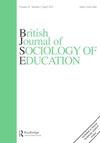Talcott Parsons’s sociology of education: cognitive rationality and normative functionalism
IF 2.1
3区 教育学
Q1 EDUCATION & EDUCATIONAL RESEARCH
引用次数: 0
Abstract
Abstract Talcott Parsons did not leave us with a global and consistent sociology of education. Instead, different aspects can be found in Parsons’s oeuvre in different theoretical contexts. This paper summarises these different parts of Parsons’s sociology of education – his writings on the concepts of education and socialisation, the university, the school, the professions, and modernisation – and discusses central criticisms and perspectives for further theoretical development. The paper goes on to argue that the value of cognitive rationality serves as a common basis of Parsons’s sociology of education and that Parsons’s sociology of education should be characterised as normative functionalist. Since the current sociology of education does not deal very intensely with Parsons’s theoretical approach, the paper also considers references to other authors and the relevance for current questions and research in the sociology of education.帕森斯教育社会学:认知理性与规范功能主义
摘要Talcott-Parsons并没有给我们留下一个全球性的、一致的教育社会学。相反,在不同的理论背景下,帕森斯的作品可以找到不同的方面。本文总结了帕森斯教育社会学的这些不同部分——他关于教育和社会化、大学、学校、职业和现代化的概念的著作——并讨论了进一步理论发展的核心批评和观点。本文认为,认知理性的价值是帕森斯教育社会学的共同基础,帕森斯的教育社会学应被定性为规范功能主义。由于当前的教育社会学并不十分重视帕森斯的理论方法,本文还考虑了对其他作者的参考以及对当前教育社会学问题和研究的相关性。
本文章由计算机程序翻译,如有差异,请以英文原文为准。
求助全文
约1分钟内获得全文
求助全文
来源期刊
CiteScore
3.70
自引率
9.50%
发文量
74
期刊介绍:
British Journal of Sociology of Education is one of the most renowned international scholarly journals in the field. The journal publishes high quality original, theoretically informed analyses of the relationship between education and society, and has an outstanding record of addressing major global debates about the social significance and impact of educational policy, provision, processes and practice in many countries around the world. The journal engages with a diverse range of contemporary and emergent social theories along with a wide range of methodological approaches. Articles investigate the discursive politics of education, social stratification and mobility, the social dimensions of all aspects of pedagogy and the curriculum, and the experiences of all those involved, from the most privileged to the most disadvantaged. The vitality of the journal is sustained by its commitment to offer independent, critical evaluations of the ways in which education interfaces with local, national, regional and global developments, contexts and agendas in all phases of formal and informal education. Contributions are expected to take into account the wide international readership of British Journal of Sociology of Education, and exhibit knowledge of previously published articles in the field. Submissions should be well located within sociological theory, and should not only be rigorous and reflexive methodologically, but also offer original insights to educational problems and or perspectives.

 求助内容:
求助内容: 应助结果提醒方式:
应助结果提醒方式:


